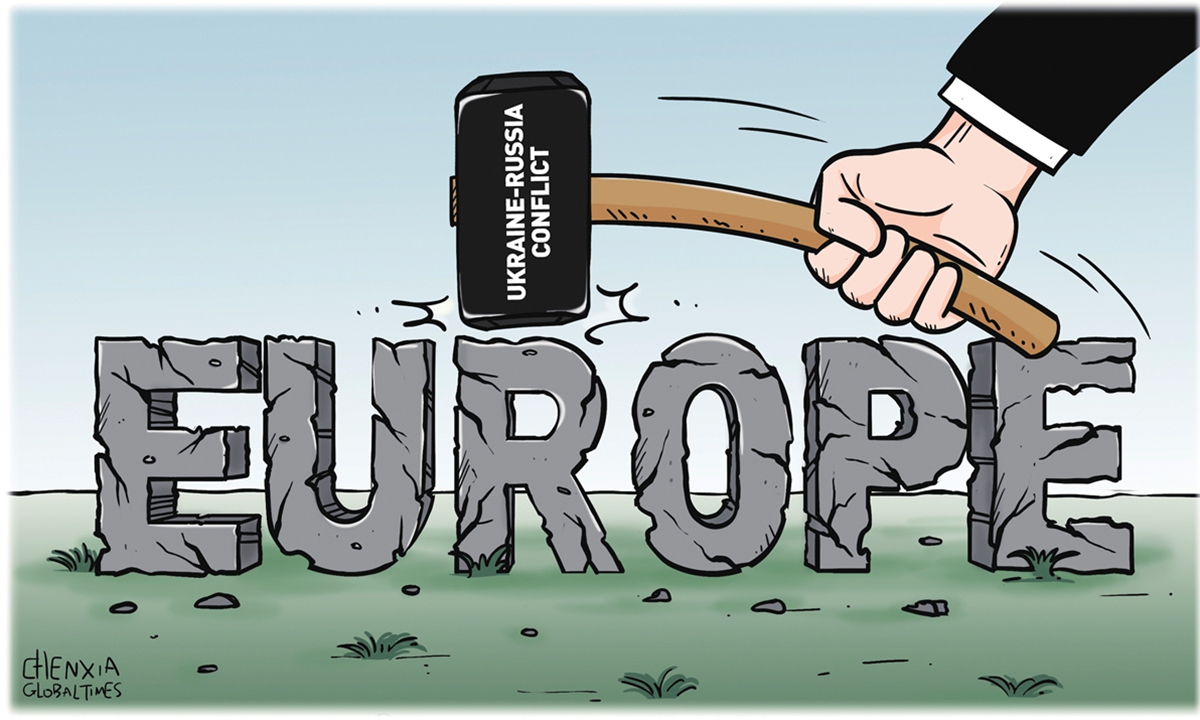
Illustration: Chen Xian/Global Times
Ukraine is set to become an official candidate for European Union (EU) membership at the EU summit to be held on Thursday and Friday. Several European diplomats confirmed Tuesday that no countries raised objections at a meeting of the bloc's ambassadors on Monday.
In the context of the ongoing Russia-Ukraine conflict, Ukraine's EU candidacy appears to be a symbolic decision, through which European countries have reaffirmed their political support for Ukraine and encouraged the Eastern European country to "hang in there" in the war.
Apparently, the EU has been completely hijacked by NATO and the US vis-à-vis this war. Facing a dilemma, it had no choice but to open its arms to Ukraine's membership, because supporting Ukraine - no matter what - has become new "political correctness" in the West.
Cui Hongjian, director of the Department of European Studies at the China Institute of International Studies, told the Global Times that for Europe, Ukraine's EU candidacy makes up for its failure to join NATO the military alliance.
Moscow has long voiced its opposition against Kiev's potential NATO membership. However, Russian President Vladimir Putin said on Friday that Russia is not against Ukraine joining the EU.
"Unlike NATO, the European Union is not a military organization or a military-political bloc… It is a sovereign decision of any country whether it wants to join an economic association and it is for the economic association to decide whether it accepts new members," he explained, as cited by the official website of the President of the Russian Federation.
In Cui's view, EU's decision on Ukraine means Ukraine has earned more significant support from the EU, and made one more step toward the West, compared to the Crimean crisis in 2014.
EU countries seem to have reached a consensus on Ukraine's candidacy out of sympathy, as they see Ukraine as a victim of the war. But even if the EU's decision can comfort the war-torn Ukraine, it will unlikely ease the "Ukraine fatigue" that many European nations have began to suffer.
According to Chinese military expert and TV commentator Song Zhongping, these countries are weary of the war and they are tired of providing various kinds of aid to Ukraine by sacrificing their own interests.
The military conflict between Moscow and Kiev hasn't ended quickly as the West had anticipated. Instead, it has shown a tendency to become a prolonged one. For Europe, this means the growing divergences on the crisis within the EU.
Many EU countries are suffering from the consequences of the war: soaring inflation, energy shortages, and even increased social divisions and political tensions.
Cui believes for these countries, more pain, especially on the economy, is yet to come. For example, Europe has just begun to feel the retroaction of the sanctions on Russia. More rounds of sanctions may lead to greater economic losses for the European countries.
Experts say Ukraine still has a long way to go before it officially becomes an EU member, as many requirements need to be met.
France's minister for European affairs Clement Beaune said in May that it would take 15 to 20 years for Ukraine to join the EU, while French President Emmanuel Macron suggested it could take "decades."
But even if Ukraine becomes part of the EU, it might still face obstacles. For instance, Putin questioned in his Friday speech in St Petersburg whether it was "advisable" for the EU to take Ukraine on as a new member, given the large amount of needed subsidies and support.
And it is unclear if Ukraine will be treated equally. "Without changing itself to fit EU's standards, Ukraine would never be on par with other members," noted Song.




